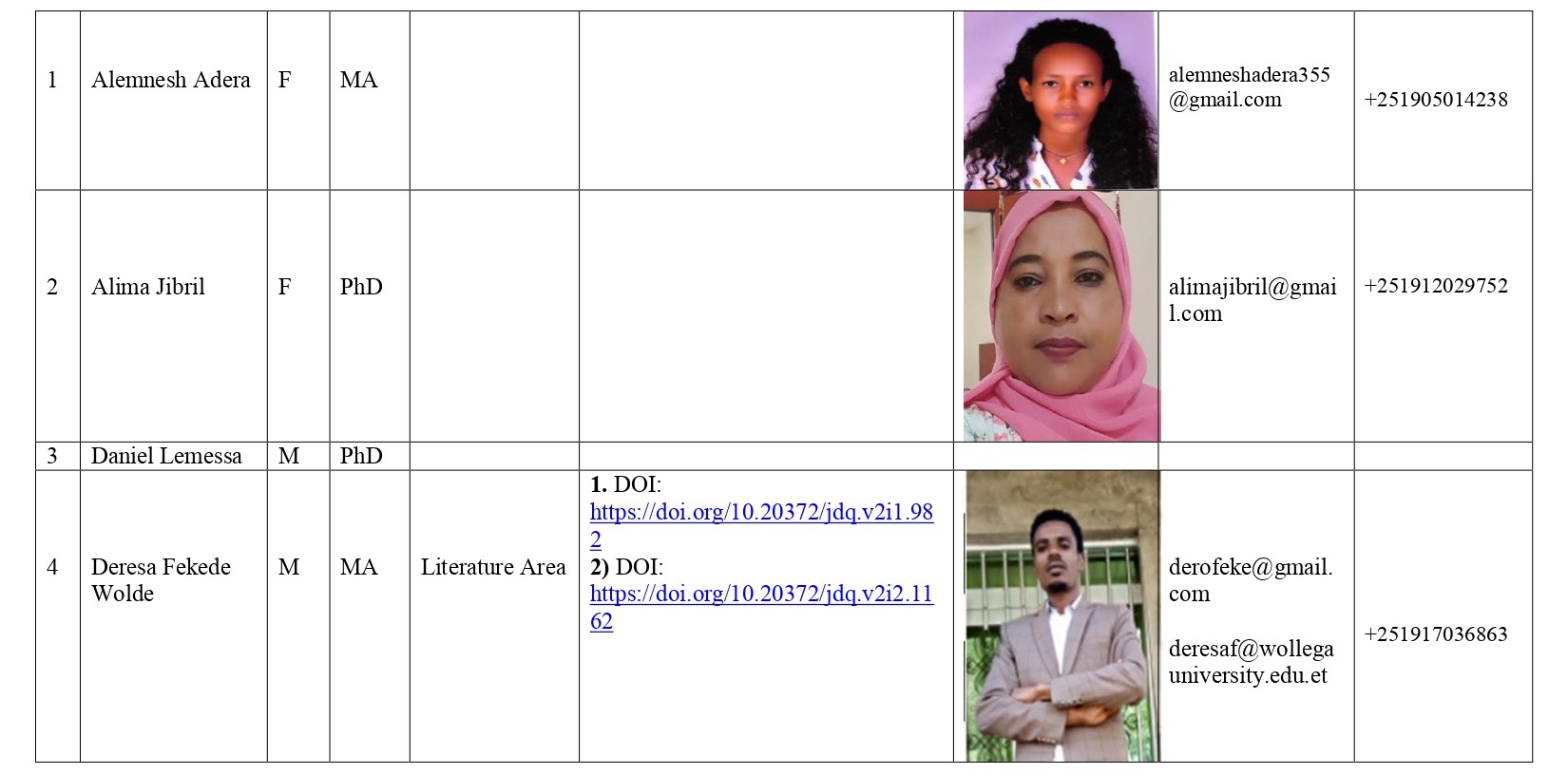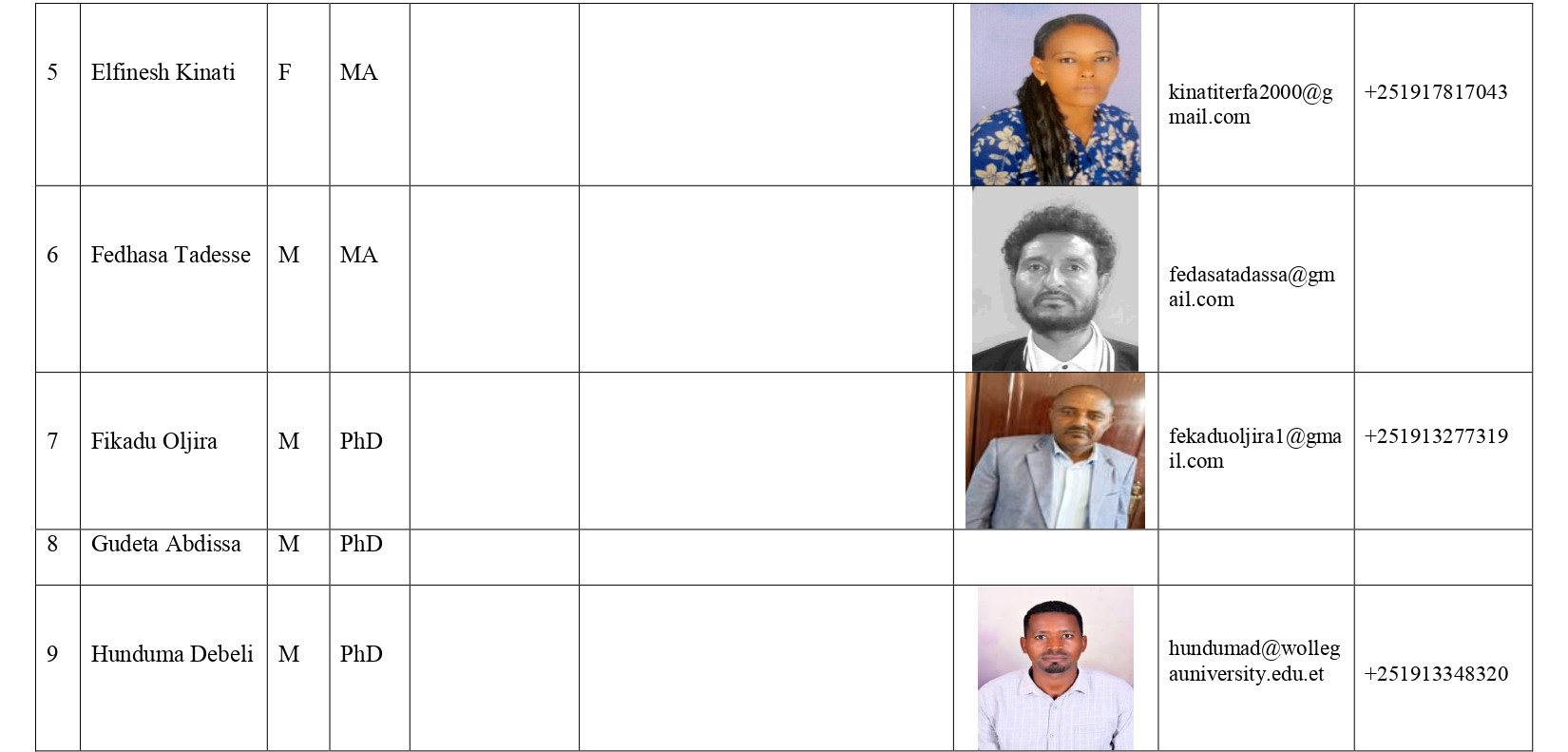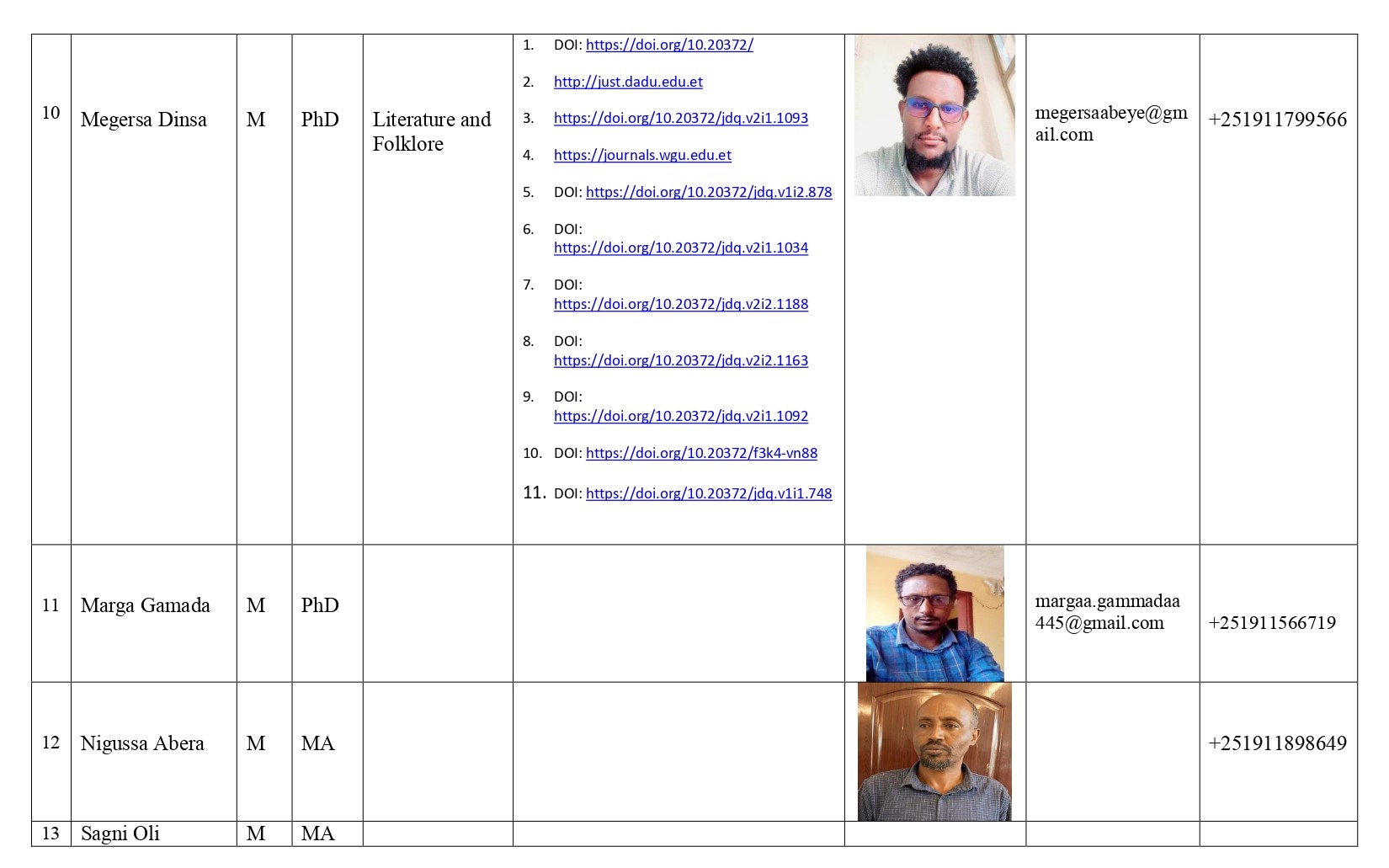



|
Programs |
M |
F |
Total |
|
B.Sc. in Food and Nutritional Sciences |
26 |
10 |
36 |
|
M.Sc. In Post-harvest Technology |
2 |
- |
2 |
 Name: Tekalign Emiru Ejigu
Name: Tekalign Emiru Ejigu
Academic Rank: Lecturer
Position: Head of Department, Fisheries and Aquatic Science
Specialization: MS.c, Environmental Science
Contact Address: Wallaga University, Shambu Campus, Oromia, Ethiopia
Telephone(s): +251917708026
Email:-
Corporate Communication Directorate office has been doing its level best in building good image of the University and keeping the reputation of the University with its credible information providing to the society through; Radio, Television, University website ,face book page and different publications .We have developed good experience of using all types of Media in communicating with the society and this has brought good opportunity to our University ,which is helpful to our University’s Development. We promise to work hard to create strong line of Communication with the Society and different stakeholders about the works we are doing for the betterment of the society all types of media available to use.
Dear our entire academic staff, administrative staff and students, I am very much delighted to give credit for your commitment in making our University fruitful and productive in all the activities running in our University. Education is a foundation to every side of human life success .It is vital to work hard in securing quality education to support our country’s multifaceted development. In this regard ,Wollega University is doing its’ level best by training quality graduates and trainees .The University’s responsibility in handling research activities is also on its highest rank. Many people have benefited from the research outputs gained from our key research centers.
Furthermore, the University is working effectively in serving the community ,especially in solving critical problems the society had been facing .It is focused on bringing tangible change ;in education, search and community Service. Food security and sanitation are some of the key areas the University intensively working to improve in the surrounding community. With the works completed so far, the university has began to harvest good fruits .We are working to provide the best comfort to our students ;in fulfilling their demands in education, food ,entertainment and any other services they demand in the course of education.
I kindly invite you to read our 2011 academic year editions of newsletters of CIICOO VOL 6 ISSUE 1,and WU-INFO SCIENCE VOL 14 ISSUE 1.The two newsletters have plenty of good news included that the University has been doing in previous months. Enjoy reading the two newsletters and give us your constructive comments to improve our strategies of communication.
Corporate Communication Directorate office has been doing its level best in building good image of the University and keeping the reputation of the University with its credible information providing to the society through; Radio, Television, University website ,face book page and different publications .We have developed good experience of using all types of Media in communicating with the society and this has brought good opportunity to our University ,which is helpful to our University’s Development. We promise to work hard to create strong line of Communication with the Society and different stakeholders about the works we are doing for the betterment of the society all types of media available to use.
Dear our entire academic staff, administrative staff and students, I am very much delighted to give credit for your commitment in making our University fruitful and productive in all the activities running in our University. Education is a foundation to every side of human life success .It is vital to work hard in securing quality education to support our country’s multifaceted development. In this regard ,Wollega University is doing its’ level best by training quality graduates and trainees .The University’s responsibility in handling research activities is also on its highest rank. Many people have benefited from the research outputs gained from our key research centers.
Furthermore, the University is working effectively in serving the community ,especially in solving critical problems the society had been facing .It is focused on bringing tangible change ;in education, search and community Service. Food security and sanitation are some of the key areas the University intensively working to improve in the surrounding community. With the works completed so far, the university has began to harvest good fruits .We are working to provide the best comfort to our students ;in fulfilling their demands in education, food ,entertainment and any other services they demand in the course of education.
I kindly invite you to read our 2011 academic year editions of newsletters of CIICOO VOL 6 ISSUE 1,and WU-INFO SCIENCE VOL 14 ISSUE 1.The two newsletters have plenty of good news included that the University has been doing in previous months. Enjoy reading the two newsletters and give us your constructive comments to improve our strategies of communication.
Corporate Communication Directorate office has been doing its level best in building good image of the University and keeping the reputation of the University with its credible information providing to the society through; Radio, Television, University website ,face book page and different publications .We have developed good experience of using all types of Media in communicating with the society and this has brought good opportunity to our University ,which is helpful to our University’s Development. We promise to work hard to create strong line of Communication with the Society and different stakeholders about the works we are doing for the betterment of the society all types of media available to use.
Dear our entire academic staff, administrative staff and students, I am very much delighted to give credit for your commitment in making our University fruitful and productive in all the activities running in our University. Education is a foundation to every side of human life success .It is vital to work hard in securing quality education to support our country’s multifaceted development. In this regard ,Wollega University is doing its’ level best by training quality graduates and trainees .The University’s responsibility in handling research activities is also on its highest rank. Many people have benefited from the research outputs gained from our key research centers.
Furthermore, the University is working effectively in serving the community ,especially in solving critical problems the society had been facing .It is focused on bringing tangible change ;in education, search and community Service. Food security and sanitation are some of the key areas the University intensively working to improve in the surrounding community. With the works completed so far, the university has began to harvest good fruits .We are working to provide the best comfort to our students ;in fulfilling their demands in education, food ,entertainment and any other services they demand in the course of education.
I kindly invite you to read our 2011 academic year editions of newsletters of CIICOO VOL 6 ISSUE 1,and WU-INFO SCIENCE VOL 14 ISSUE 1.The two newsletters have plenty of good news included that the University has been doing in previous months. Enjoy reading the two newsletters and give us your constructive comments to improve our strategies of communication.
Corporate Communication Directorate office has been doing its level best in building good image of the University and keeping the reputation of the University with its credible information providing to the society through; Radio, Television, University website ,face book page and different publications .We have developed good experience of using all types of Media in communicating with the society and this has brought good opportunity to our University ,which is helpful to our University’s Development. We promise to work hard to create strong line of Communication with the Society and different stakeholders about the works we are doing for the betterment of the society all types of media available to use.
Dear our entire academic staff, administrative staff and students, I am very much delighted to give credit for your commitment in making our University fruitful and productive in all the activities running in our University. Education is a foundation to every side of human life success .It is vital to work hard in securing quality education to support our country’s multifaceted development. In this regard ,Wollega University is doing its’ level best by training quality graduates and trainees .The University’s responsibility in handling research activities is also on its highest rank. Many people have benefited from the research outputs gained from our key research centers.
Furthermore, the University is working effectively in serving the community ,especially in solving critical problems the society had been facing .It is focused on bringing tangible change ;in education, search and community Service. Food security and sanitation are some of the key areas the University intensively working to improve in the surrounding community. With the works completed so far, the university has began to harvest good fruits .We are working to provide the best comfort to our students ;in fulfilling their demands in education, food ,entertainment and any other services they demand in the course of education.
I kindly invite you to read our 2011 academic year editions of newsletters of CIICOO VOL 6 ISSUE 1,and WU-INFO SCIENCE VOL 14 ISSUE 1.The two newsletters have plenty of good news included that the University has been doing in previous months. Enjoy reading the two newsletters and give us your constructive comments to improve our strategies of communication.
Corporate Communication Directorate office has been doing its level best in building good image of the University and keeping the reputation of the University with its credible information providing to the society through; Radio, Television, University website ,face book page and different publications .We have developed good experience of using all types of Media in communicating with the society and this has brought good opportunity to our University ,which is helpful to our University’s Development. We promise to work hard to create strong line of Communication with the Society and different stakeholders about the works we are doing for the betterment of the society all types of media available to use.
Dear our entire academic staff, administrative staff and students, I am very much delighted to give credit for your commitment in making our University fruitful and productive in all the activities running in our University. Education is a foundation to every side of human life success .It is vital to work hard in securing quality education to support our country’s multifaceted development. In this regard ,Wollega University is doing its’ level best by training quality graduates and trainees .The University’s responsibility in handling research activities is also on its highest rank. Many people have benefited from the research outputs gained from our key research centers.
Furthermore, the University is working effectively in serving the community ,especially in solving critical problems the society had been facing .It is focused on bringing tangible change ;in education, search and community Service. Food security and sanitation are some of the key areas the University intensively working to improve in the surrounding community. With the works completed so far, the university has began to harvest good fruits .We are working to provide the best comfort to our students ;in fulfilling their demands in education, food ,entertainment and any other services they demand in the course of education.
I kindly invite you to read our 2011 academic year editions of newsletters of CIICOO VOL 6 ISSUE 1,and WU-INFO SCIENCE VOL 14 ISSUE 1.The two newsletters have plenty of good news included that the University has been doing in previous months. Enjoy reading the two newsletters and give us your constructive comments to improve our strategies of communication.
Main Campus (Nekemte)
Gimbi Campus(Faculty of Social Science and Humanity, Resource Mgmt. and Economics, Natural and Environmental Science , Business and Development )
Shambu Campus(Fuculty of Agriculture, Technology, Resource Mgmt. and Economics )